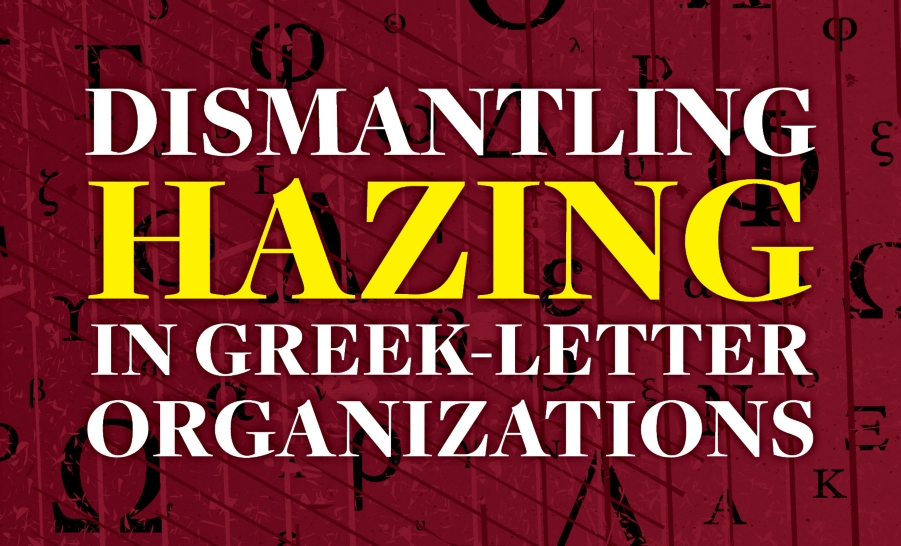How to Make College a Better Bet for More People
To explore how to lift people’s prospects, The Chronicle brought together a campus leader, a public official, a researcher, and a college counselor.
Meriwether et al. / NASPA / March 2020

More than half of college students are hazed in the process of joining student organizations, while 7 out of every 10 students who pledge or rush a fraternity or sorority experience some form of hazing or violence. In recent years, numerous student deaths caused by hazing have called into question the value of these organizations, while college leaders seek solutions that keep students safe.
Dismantling Hazing in Greek-Letter Organizations offers practical strategies to address the complexities of hazing culture and the challenges associated with recruitment and initiation in varying contexts. Each chapter focuses on the nuanced elements of hazing within sorority and fraternity subcultures and explores the hidden harms inside these secretive and tradition-laden systems.
This engaging publication shares insights into fraternal and sororal systems by examining under-researched elements of hazing and challenging unacceptable practices within those systems. Written by educators in practice who work directly with fraternity and sorority members, national organizations, and campus leaders, the book presents an extensive selection of effective prevention-based practices that all stakeholders—both on and off campus—can use. This text provides readers with new educative models and tools to mitigate the impact of “tradition” as it competes with the value for life within Greek-letter organizations with one ultimate goal: to save the lives of students.
“Dismantling Hazing in Greek-Letter Organizations takes a true deep dive into hazing culture and provides higher education leaders with practical strategies to educate students about the risks and dangers of hazing. I highly recommend this authentic guide to all college and university administrators who have a desire to further understand and investigate Greek-letter organizational hazing.” —Kent J. Smith Jr., President, Langston University
“Hazing is a true reality of fraternity and sorority life today. This book is very timely and necessary as it provides best practices for colleges and universities in eradicating hazing everywhere.” —Jennifer Jones, Executive Director of Student Life, Southern Methodist University; 33rd National President, National Pan-Hellenic Council; Co-Chair, NASPA Fraternity and Sorority Knowledge Community
“Jason Meriwether and the impressive group of colleagues he has assembled provide a thorough and thoughtful discussion of the history, implications, and strategies for intervention related to hazing in Greek-letter organizations. The scholarly information and practitioner-oriented insights presented, when shared with student leaders, parents, and other stakeholders, offer hope for improving the experiences of students in GLOs and other campus organizations through meaningful changes in culture and process.” —George S. McClellan, Associate Professor of Higher Education, University of Mississippi
“Previous scholarship directed at hazing in campus Greek-letter organizations too often played down the deadly consequences of criminal hazing in student groups. Jason Meriwether’s excellent collection of essays uses science, scholarship, and good sense to provide college presidents and student life staffers the needed tools to eradicate the deadly, demeaning, and antediluvian rituals of hazing. This book will gather no dust on my top bookshelf.” —Hank Nuwer, Professor, Pulliam School of Journalism, Franklin College; Author, Hazing: Destroying Young Lives
“A must-read that has a robust insight into the history, education, and prevention of hazing from industry leaders!” —Alex Snowden, Associate Dean of Student Engagement and Retention, Eastfield College; Co-Chair, NASPA Fraternity and Sorority Knowledge Community
“As a former fraternity/sorority advisor and now a vice president for student affairs and enrollment services with over 37 years of higher education experience, unfortunately I have dealt with hazing in Greek-letter organizations my entire career. Dismantling Hazing in Greek-Letter Organizations is a timely publication as these organizations are under major scrutiny across the country, and hazing is at the center of the conversation because student safety and well-being is threatened. The book is on point with a focus on changing the culture, whether it be breaking the cycle or redefining the culture and standards within all types of Greek-letter organizations. This a comprehensive resource for aiding higher education administrators with addressing the issue of hazing on their respective campuses.” —Richard Walker, Vice Chancellor for Student Affairs and Enrollment Services, University of Houston System; Vice President for Student Affairs and Enrollment Services, University of Houston
“Hazing is an issue that emerged from rites of passage processes in societies around the world and is centuries old. It embedded itself in groups, institutions, and organizations the world over—collegiate-based fraternities and sororities among them. For over a century, organizational leaders, commentators, and researchers have sought to make sense of hazing and search for solutions. Individuals’ lives and the sustainability and viability of fraternities and sororities depend on it. In Dismantling Hazing in Greek-Letter Organizations, Jason Meriwether and the contributing authors help us make sense of the hazing research literature and stretch beyond it to propose workable solutions to hazing. We need a paradigm shift in this space, and Dismantling Hazing gives us a running start at it.” —Gregory S. Parks, Professor of Law, Wake Forest University School of Law; Co-Author, A Pledge with Purpose: Black Sororities and Fraternities and the Fight for Equality